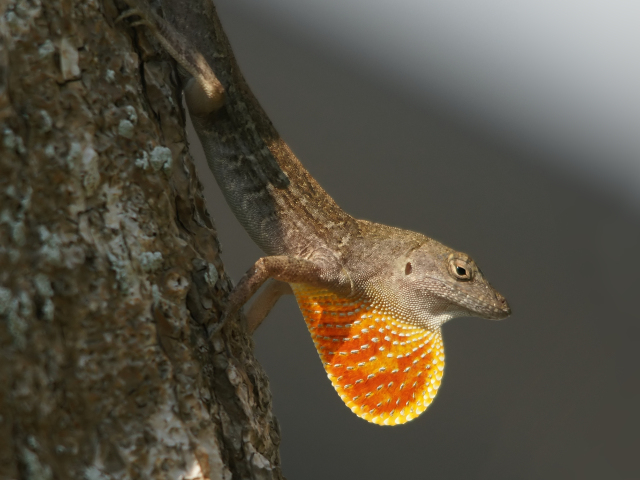Tropical lizard might outrace climate change
A new study looks at survival of the fittest in an increasingly warm world
Shannon Hall • October 4, 2014

Climate change is affecting an array of animals, from bees to polar bears, but new research shows that one tropical lizards species might be quick enough to survive. [Image credit: Hans Hillewaert]
Small lizards are notorious for scurrying in and out of view faster than you can grab your camera. They’re cute but quick — an attribute that just might save one particular species from potential extinction.
Cold-blooded animals like the brown anole lizard, native to the Bahamas and recently introduced to the southern U.S. after escaping as pets, are used to relatively stable climates in the tropics. Some researchers think rising temperatures caused by climate change might push them toward disappearing forever.
A new study led by Michael Logan of Dartmouth College found the lizards that run faster across an array of temperatures have a better chance of surviving forthcoming climate changes than their slower counterparts. The results were published in the September 15 issue of the Proceedings of the National Academy of Sciences.
Logan and his colleagues measured natural selection in two wild populations of brown anole lizards. One group was left in place: a relatively cool forest. The other group was transplanted to a location that would mimic the effects of climate change: a warmer peninsula with a greater range of temperatures.
Before moving the lizards, however, Logan and his colleagues conducted a critical test. Lizards must run quickly to catch prey and avoid predators. So they placed the lizards in an incubator and then measured their speed at different body temperatures. With this data in hand they let them loose.
Just 22 percent of the transplanted lizards and 45 percent of the control lizards survived the breeding season. But there was a clear trend: the lizards that ran the fastest at warmer temperatures (and across a broad range of temperatures in general) survived. So the researchers think lizards will likely use speed to compensate for the oncoming effects of climate change.
This research is the first direct measurement of climate-driven natural selection on the thermal physiology of a wildlife species. So it’s unclear if other cold-blooded species will be able to do the same. But at least we can have some hope that these quick lizards will weather the storms ahead.